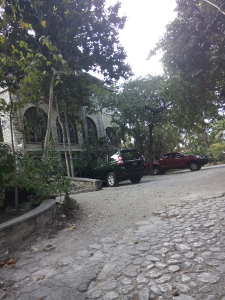Haiti, Permanently Provisional: Impressions from the Field
News from Aug 24, 2016
On January 12, 2010, an earthquake destroyed Port-au-Prince, the capital of Haiti. Within 30 seconds, several hundred thousand people had died and more than a million residents lost everything. But even before the devastating earthquake of 2010 bad news from Haiti was common, shaped by poverty and political instability. By now people have grown used to the images of poverty, destruction, and angry protesters.
The photo chosen for this report, however, shows a different reality. A villa surrounded by parked Jeeps, green palm trees, and walls. It is the reality of international organizations (IOs).
In our D8 project, “‘Talk and Action’: How International Organizations React to Areas of Limited Statehood,” we look at the perspectives of international organizations on statehood, their choice of governance activities, and their perception of their own role. While in Haiti, I conducted interviews with employees of the World Bank, the Food and Agriculture Organization of the United Nations (FAO), the World Food Programme (WFP), the Inter-American Development Bank (IDB), and the emergency humanitarian aid program of the EU (ECHO) – all IOs that are concerned with food security.
Haiti is the country in our project ranked worst in the Bertelsmann Transformation Index (BTI) in terms of both the strength of administrative capacity and the degree to which the state maintains a monopoly on force. Staff of the IOs described an endless list of structural capacity deficits attributed to the Haitian state. In addition to a lack of material resources, they complained of the administration’s inability to plan ahead. Ultimately, they reported, weak institutions led mayors and cabinet members to serve their own clients first in order to stay in power.
The monopoly on force in Haiti is not in the hands of the state. There is no army; by its own account the UN Stabilization Mission (MINUSTAH) keeps the peace. Luckily there are no rebel groups threatening peace at the moment. For the IOs, the state´s latently limited monopoly on force is not a pressing challenge, since they can still maintain access to their governance addressees.
Is Haiti a “Republic of IOs”? No, not anymore. The overall budget for aid in Haiti has sunk once again to the 2010 level. Contrary to the narrative – widespread in Haiti – of an inefficient, neo-colonial development aid industry, I met a number of experts who are competent in their fields of expertise, care deeply about the wellbeing of the population, and think critically and constantly about which measures can truly lead to positive effects. All IOs in our project’s study have undergone comprehensive evaluations in recent years in order to analyze their engagement in Haiti since the earthquake. There was consensus among the organizations that directly after the earthquake, a new structure needed to be established parallel to the state in order to coordinate aid. But the IOs’ reflections, which were indeed self-critical, also suggest that a transition from emergency to development aid never really took place. Even today, many find it extremely challenging to strike the right balance between solidarity and autonomy. Considering the weak state structures and a barely accountable elite, governance services can only be provided effectively in cooperation with engaged local leaders. An initial analysis of my fieldwork reiterates that particularly IOs with a focus on development are increasingly forced to think creatively when helping to build local capacities. Humanitarian organizations, too, are trying more and more to incorporate non-state governance institutions. In doing so, the IOs acknowledge that they will occasionally have to cede responsibility even in places where neither the state nor non-state actors can replace them 100%. Only in this way can the vicious cycle of foreign and self-disempowerment be broken.
At the same time, the next emergencies are just around the corner: The ground in Haiti is nearly strained to its maximum. Hurricanes, floods, forest clearance, and the use of pesticides have long wreaked havoc on the landscape. Three successive years of drought led once again to a crop shortage. The IOs are currently preparing emergency aid to help the approximately one million people who will likely suffer major food insecurity as a result. Without them it would not work. Not yet.
 |
About the Author: Leon Valentin Schettler is a research associate in the project D8 “‘Talk and Action’: How International Organizations React to Areas of Limited Statehood.” He is currently conducting case studies on transnational programs in the field of food security in Latin America (Colombia) and the Caribbean (Haiti). |

